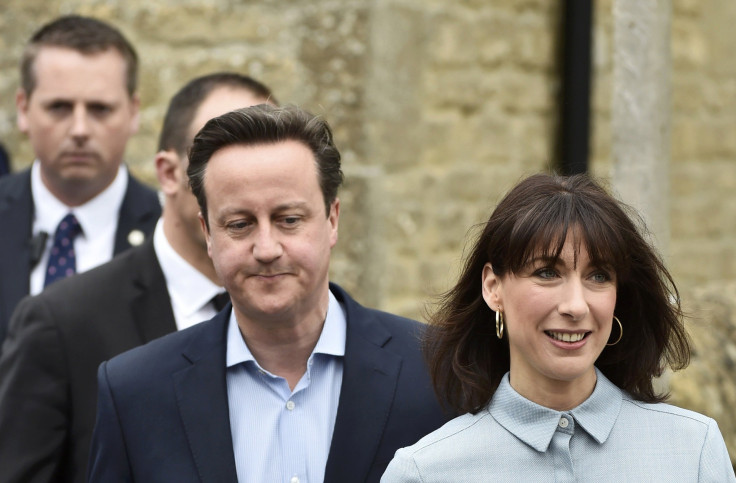UK Election Results 2015: Polls Closed, Votes Rolling In

UPDATE 9:30 p.m. EDT: 20-year-old SNP candidate for Paisley & Renfrewshire South, Mhairi Black, has become the youngest MP ever with her victory on Thursday. She takes the seat from Labour's Douglas Alexander with more than 23,000 votes to his 17,000 votes. Black's victory is more indication that projections that the SNP would nearly sweep all of Scotland's seats could be accurate.
20 year old #SNP student @mhairi1921 has beaten #Labour’s Douglas Alexander to become the youngest ever MP. pic.twitter.com/2OLxOwvmJd
- Channel 4 News (@Channel4News) May 8, 2015UPDATE 8:00 p.m. EDT: The Conservatives are on the board after holding their seats in Swindon North and Putney by sizeable margins. UKIP, which performed well in the first three constituencies declared, did not secure a notable number of votes in either Tory stronghold.
UPDATE 6 p.m. EDT: Per tradition, Houghton & Sunderland South has declared its results first. Labour secured an overwhelming victory in the northeast England seat with more than 21,000 to a combined 17,500 votes for all other parties, not a huge surprise considering Houghton & Sunderland South's strong pro-Labour history. UKIP’s 8,280 votes beat out the Conservatives' 7,105 votes, which comes as a surprise. The Euroskeptic U.K. Independence Party polled well going into Thursday’s election, but their votes were expected to be spread out among many constituencies, so they were not projected to win many seats.
UPDATE 5:28 p.m. EDT: Party leaders are urging caution in regards to an exit poll that suggests the Conservative Party will far outperform previous projections. SNP leader Nicola Sturgeon played down the projection that her party would win a stunning 58 of 59 seats in Scotland, saying “58 seats is unlikely,” according to BBC.
Lib Dem sources tell me the exit poll is "implausible". They believe they have won between 25 and 30 seats. Still pretty poor result
- Kamal Ahmed (@bbckamal) May 7, 2015Treat #GE2015 exit poll with "huge caution", SNP's Nicola Sturgeon tweets. "I think 58 seats is unlikely" http://t.co/jpy6wse1Rp
- BBC Breaking News (@BBCBreaking) May 7, 2015UPDATE 5:15 p.m. EDT: The first exit poll, released by polling firms Ipsos MORI and GfK NOP indicates David Cameron’s Conservative Party will perform better than expected. The exit poll gives the Tories 316 votes, eight seats short of a majority. Their coalition partners from 2010, the Liberal Democrats, are expected to lose big, but still hold on to 10 seats. That would allow the same Con-Lib Dem coalition to form a bare majority once again.
Ed Miliband’s Labour Party is projected to get 239 seats, down from their 256 previous seats. Many of those losses are likely to come from Scotland, where the Scottish National Party is projected to nab 58 out of 59 total constituencies. The Euroskeptic United Kingdom Independence Party is projected to keep its two seats in the House of Commons.
ORIGINAL STORY:
The polls have closed in Britain, where voters cast their ballots for a new House of Commons in what is expected to be one of the closest U.K. general elections in recent history. Neither of the largest parties, Labour and the Conservatives, is expected to win the 323 seats needed for a parliamentary majority, so the smaller parties will have much sway in forming a new government.
The polls closed at 10 p.m. British Summer Time (5 p.m. EDT), though people waiting in line at that time will be allowed to vote. Exit polls are expected shortly afterward and the first official count from Houghton & Sunderland South in northeast England -- traditionally the first seat to declare -- is expected an hour later. Incumbent Prime Minister David Cameron, a Conservative, is to speak in his constituency of Witney around 4:30 a.m. BST (11:30 p.m. EDT) and if his Tories appear victorious, he should provide some indication of how he will approach forming a coalition government. The election is expected to come right down to the last few constituencies to declare, which should be around 1 p.m. BST (7 a.m. EDT) on Friday. See the Telegraph’s full timeline of expected results and what they mean here.
Surveys over the last week have showed the Labour and Conservative parties nearly tied going into the polls. The latest survey by BMG, published just 36 hours before polls opened, actually puts the rival parties at 33.7 percentage points each. Some other polls show either party with slight leads. Besides the two thirds who would go with either of the big parties, 12 percent of respondents to the BMG poll said they would vote for the right-wing, anti-European Union UK Independence Party, 10 percent said the Liberal Democrats, 4 percent said the Scottish National Party and 4 percent said the Green Party.
In the last election in 2010, Cameron's Conservative's won 302 Commons seats to Labour's 256. The Tories joined with the centrist Liberal Democrats, who won 56 seats, to form a coalition government. That didn't go over well with the Lib Dem base. Many voters said the Lib Dems, led by Deputy Prime Minister Nick Clegg, betrayed their campaign promises to get into government with the Tories. Besides Labour, all other opposition parties only captured a handful of seats each.
See IBTimes’ election primer here.
This is a developing story. Please come back for updates as the returns come in.
© Copyright IBTimes 2024. All rights reserved.






















